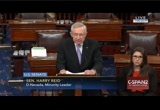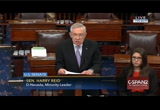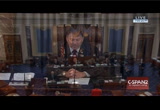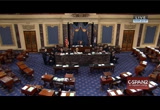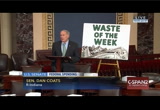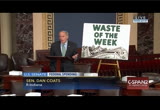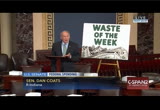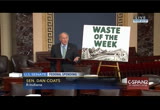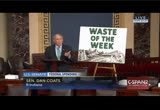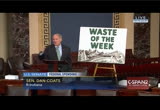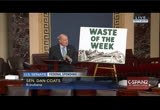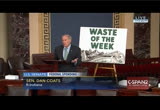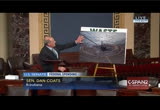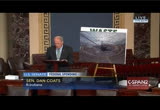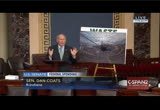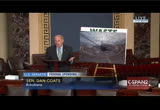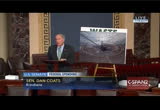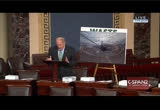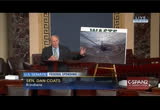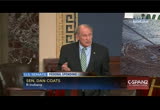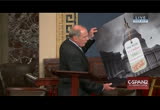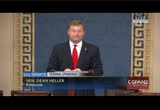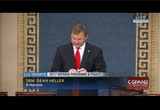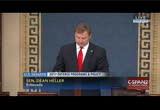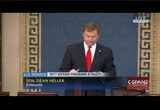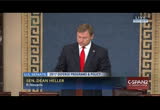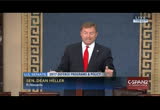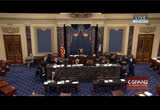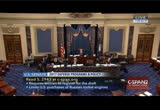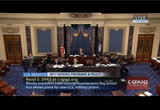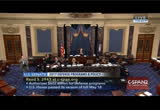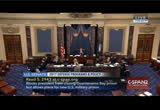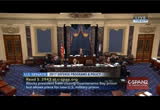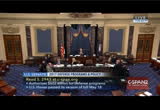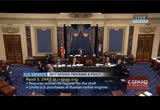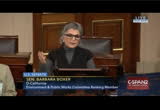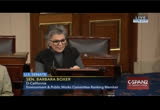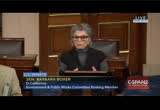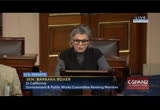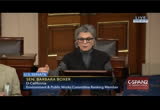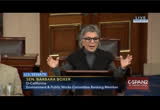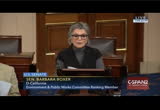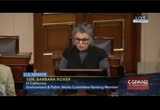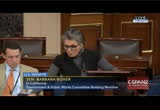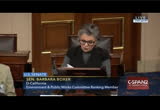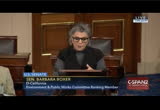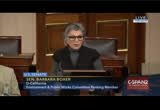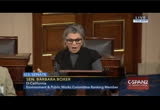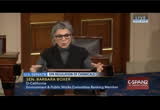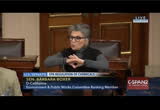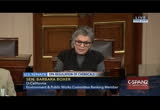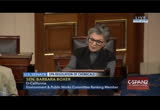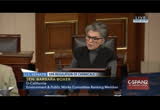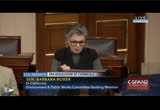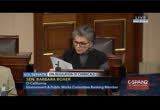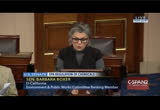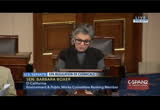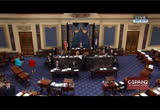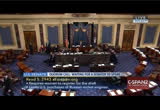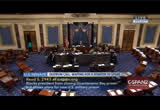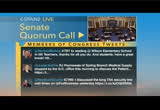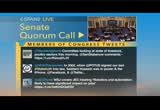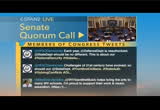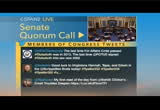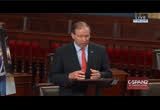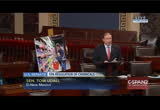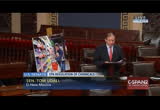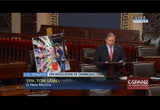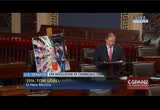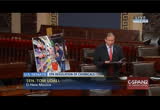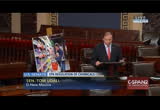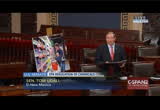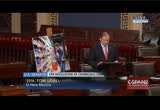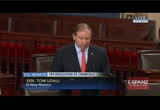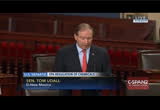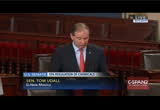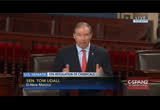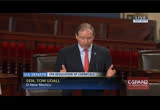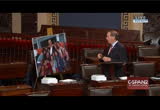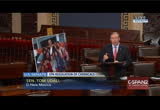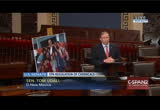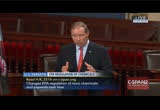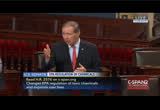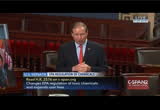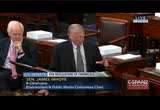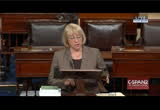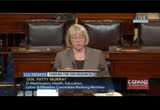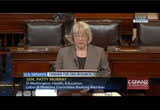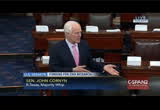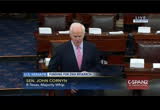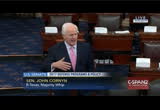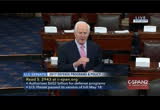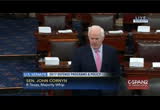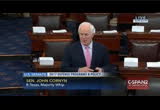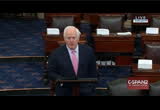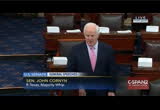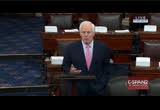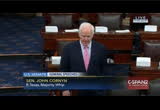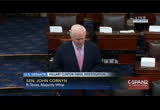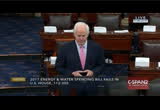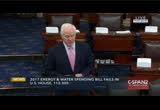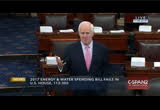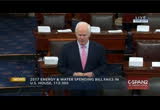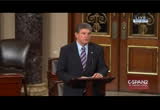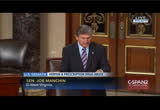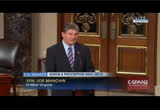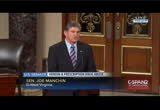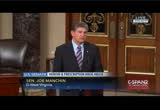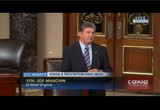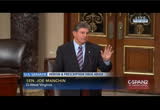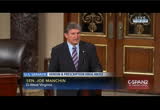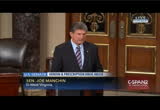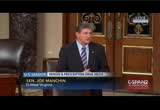tv US Senate CSPAN May 26, 2016 10:00am-12:01pm EDT
10:00 am
for starters, the vast majority of enrollees in arkansas are protected from premium increases. why? because obamacare tax credits actually cap health premiums for 85% of consumers. in arkansas 87% of consumers receive tax credits that help make coverage affordable. 6 262% have the option to selects plans as low as $75 per month after tax credits. but there are other obama care provisions that safeguard against these rates, any rates that are out of line, thanks to a provision within the law, state leaders have the resources to conduct a thorough review of the proposed rate increases. in arkansas' case, the state received $9.2 million to study a proposed premium increase. now it's up to arkansas' governor and insurance commissioner to do their job and examine their rate proposals. state leaders have until august 23 to approve final rates for the 2017 exchanges.
10:01 am
arkansas insurance commissioner allen kerr has already made it clear that he and the governor oppose the hikes in pay. governor hutchison i son, who is a -- governor hutchison, who is a well-known, fine man. i served with his brother in congress. his brother was in the senate. governor hutchison and i -- this is according to what allen kerr says, and i quote, governor hutchison and i do not believe there is substantive justification for these rate increases. for that reason, we expect to take action to deny the requested rate increases. until there is sufficient justification to properly consider any rate increases, close quote. so before we pass the affordable care act, everyone, americans in the individual insurance market were hit with double-digit health premium increases every year, without any exception. back then if the insurance company said you paid more, you paid more or lost your insurance. consumers had no recourse. they charged more because they
10:02 am
had an illness the previous year. they would charge more for all kinds of reasons. they would deny covering certain conditions altogether. one was if you are a woman. now americans have obamacare in their corner. insurers can no longer charge more because you were sick or denying coverage of certain conditions altogether period are covered. and when insurance companies want premium increases, states have resources to fight back, just like arkansas. and when consumers decide that a plan is no longer working, they can and should shop around. in fact, everyone should do all that they can to ensure that they're getting the best deal possible. that's what these marketplaces are for, giving the american people options. so for all the misinformation on the republican leader, he should be embarrassed by what he said this morning. for all this misinformation here on the senate floor almost every day, the truth hadn't be hidden. the affordable care act is keeping americans insured and providing them options to get
10:03 am
health coverage that meets their needs. that's why today, that's why today, my friends, the republican leader, that's why today america has the lowest uninsured rate in the history of the country. 9.1% is all that's uninsured. the lowest rate ever. the facts are undeniable. the affordable care act is working. mr. president, would you announce what we're going to do the rest of the day? the presiding officer: under the previous order, the leadership time is reserved. under the previous order, the senate will resume consideration of the motion to proceed to s. 2943, which the clerk will report. the clerk: motion to proceed to the consideration of s. 2943, an act to authorize appropriations for fiscal year 2017 for military activities of the department of defense, and so forth and for other purposes.
10:04 am
the presiding officer: the clerk will call the roll. quorum call: mr. coats: mr. president? the presiding officer: the senator from indiana. mr. coats: mr. president, are we currently in a quorum call? the presiding officer: we are. mr. coats: i ask that that quorum call be abrogated. the presiding officer: without objection. mr. coats: mr. president, i'm back here now for the 44th edition of waste of the week. i'm starting to enjoy these things. i hope someone else is. what we don't enjoy is the fact the government is wasting taxpayer money and documenting for 44 weeks now we have come up with a significant total approaching $200 billion of
10:05 am
waste. you know, people get up every morning, go to work, put in a hard day's work if they have a job, try to save money so that they can get the mortgage paid each month, get the insurance covered, get the gas tank filled up in the car, and hopefully save a little money to send so their kids when they are ready for school they will have the ability to pay some tuition. so the children can get a good education. every time they get a paycheck, at the end of the week, they look at it and they see deductions for this and that, state taxes, federal taxes, sales tax, excise taxes. you go to the pump, you pay a price for a gallon of tax and incorporated in that depending on what your state charges there is significant tax included. on and on it goes. you can't go to the grocery
10:06 am
store, can't go to a clothing store, retail store without getting a tax slapped on everything that you buy. so that money comes to washington on a federal tax. at the very least, the taxpayer is due. careful use of their hard-earned tax dollars to fund the federal government. there are essential functions that the federal government and only the federal government can deal with. interstate highways is one. states participate in that. but to have an interstate system, you need some federal support. but of course our national defense. now, the minority leader was just talking about delays, delays, delays and not getting anything done. all week i have been standing around, my colleagues have been standing around here waiting to move onto one of the essential functions of government that must be done every year, and that's funding for our national security and our national
10:07 am
defense. by the use of parliament maneuvers, the minority leader here who was just talking about not getting anything done is the person -- is the reason why we're not getting it done. and i can understand there is an issue that the other side doesn't think should go forward, and they want to use senatorial privileges and procedures to stop it from going forward, i mean that happens on both sides of the aisle. but national defense is something that we might have a bipartisan support for. in the end, this bill will pass probably 98-2 or 100-0 or something along those lines. what the minority leader didn't say is that the defense committee, which has spent literally hundreds of hours putting this thing together, every democrat on that committee has supported it. and so the leader comes down here and says we don't know what's in it.
10:08 am
well, it's his own people that have written this thing, along with republicans, and in the end sanctioned it by voting for it. every democrat on this armed services committee has voted for this bill, and the minority leader comes down here and says we don't know what's in it. why don't you talk to your own people. why don't you talk to the people that you have assigned to that committee? i can understand why he doesn't want to read every word of this bill. i don't think he reads every word of any bill. but to simply use that as a tactic to keep us from going forward with something that the federal government must do, provide for our defense at a time of threats as high as we have ever seen. the world is on fire. we need a strong national defense. both democrats and republicans understand that, and yet we have wasted an entire week because the minority leader has used procedural motions to keep us from even talking about the bill. this isn't passage of the bill,
10:09 am
this isn't amending the bill. this is even having the ability to come here and start talking about it. so anyway, i didn't come down here to discuss this particular issue. i came down here to talk about how federal -- how money is used that is sent here by taxpayers and the waste that occurs and the misuse of that spending, but you capital sit here very long and listen to the minority leader and come to any conclusion that you've got to at least say some response when somebody as nonsensical as what the minority leader was trying to say. probably the only good news is very few people were watching, so what difference does it make? i'm here and i hope people are watching to talk about waste of the week. i see that the wages are -- i hope you enjoy this one. some of these things you can't make up, mr. president. the government accountability office has the accountability
10:10 am
with what we do with taxpayer dollars. i think he put pouring stuff out of here through the inspectors generals whose job it is to make sure the taxpayer dollars are spent according to what they need to be spent for, but there is a category called waste, fraud and abuse, and what i have been doing is just scratching the surface of the waste, fraud and abuse of taxpayers' dollars, hard-earned taxpayers' dollars, dollars that ought to go into the savings of our taxpayers and not sent here to washington to be wasted. i have been down here now for 44 weeks, 44 times talking about separate wastes of the week, and it's outrageous. and so if this body ought to be doing anything, we ought to at least take the word from those in government that have pointed at agencies that have incorporated waste, fraud and abuse and not dealt with it. so here we go for waste of the week number 44. it's called the solar field of
10:11 am
death. it sounds like a movie, doesn't it? solar field of death. this week we're looking at a solar power plant that puts taxpayers on the hook for $1.5 billion. yes. $1.5 billion. here's the history. in 2011, the department of energy provided a $1.5 billion loan guaranteed for the development of a solar thermal field in california called desert sunlight. okay? we all know there is a lot of sunlight in the desert. that's one of the largest solar thermal fields in the world. but most of us understand and we see these solar fields going on, maybe there are solar panels on top of some houses and commercial buildings, there is fields of solar fields absorbing the sunlight, turning it into energy, and that's an alternative energy to what we usually get from the power plant that's burning coal, burning gas or whatever.
10:12 am
environmentalists like this because it doesn't use coal. there has been a war on coal here, a war on fossil fuels. what really surprises me is the war on natural gas which is the fraction of what carbon emissions come out of fossil fuels. nevertheless alternative energy is something that the government has been pursuing, but we would like them to pursue that in a way that's economically feasible and doesn't put the taxpayer at such great risk. well, the obama administration essentially in its war on coal has said look, go on out there. we'll put up loan guarantees, do your thing, experiment, et cetera, et cetera, et cetera, and if it fails, don't worry, the taxpayer will back it up because we have given a guarantee to these companies who come up with some ideas. some of these ideas have worked, some of them have been cost-effective, much fewer than
10:13 am
people thought but some of them have. this one was supposed to be the ultimate. let's go out in the desert, the sun shines all the time, we will put not solar panels, but we're going to put mirrors. here's how this thing is developed. the huge field of mirrors -- and let me just give you a glimpse of what this -- what this thing looks like. all right. that's out in the desert. these are literally millions of mirrors out there all directed at this tower. this tower then reflects the heat coming off -- bouncing off the mirrors, all directed in here toward this tower, which then boils water and then it conventionally uses generators to absorb that energy and produce that energy and then send it out over the wires to
10:14 am
light up homes and factories and provide electricity for people in southern california. now, it sounds pretty straightforward. maybe a good idea. it probably would have been good if they had tested it out before they put the millions of mirrors in there. they would have learned some things. what's the first thing they learned? because clouds, hmmm. nobody seemed to factor in that, you know, the sun doesn't always shine in the desert because sometimes there are clouds. as it turned out, a third of the power that they thought they were going to get they don't get because it's cloudy. now, you think somebody would have said before the government offered $1.5 billion guarantee, what about those cloudy days? i mean, you have projected how much energy we can get to light up and provide electricity for
10:15 am
southern california when the sun is shining, but you're operating this on the basis that the sun is always going to be shining. how about nighttime? how much heat are we going to get off the moon directing toward those mirrors? not very much if anything. so clouds and night came into a factor, and what we found out, the plant is now producing only about a quarter of the energy that was originally envisioned. now, i'm not a scientist. i'm not somebody who has specialty in alternative energy, but i think i would have had the gumtion -- gumption to say how about clouds? how about nighttime? are these projections you have made regarding the kind of energy will be produced are be cost effective so the taxpayer is not on the hook? apparently somebody didn't
10:16 am
figure that out because we're only getting a quarter of would we thought we were going to get out of that. now, so what the energy company did is say, okay, we're not getting what we want but we need an extension. we need extensions on the payments to the federal government because the plant isn't generating the kind of energy ndz, therefore, not -- and, therefore, not getting the kind of profits from the users of the electricity to pay back on the loan. so the obama administration said yeah, we're for all a tern tif energy, go -- alternative energy, go ahead and we'll extend this. and they did extend this. the california public utilities commission gave the plant a lifeline giving it one more year to fix the problems. another problem was while production improved, the average price for a megawatt hour of electricity from the plant was $150. compare that with the price for a megawatt, the same amount of
10:17 am
energy on natural gas, $35. so the customer said wait a minute, i'm paying the utility bill at the rate of $150 per megawatt hour of electricity, and if we -- we were using natural gas, we could only pay $35. so what's the deal here? well, what's -- it's turned out that alternative energy, while it's alternative also is not cost effective. and the question is, well, but we're saving on carbon emissio emissions. okay. well, that didn't work either. for starters, it takes the boilers that they got to heat up because, of course, it's nighttime and the mirrors aren't reflecting any sun that reflects heat that causes the water to boil and can be used for
10:18 am
turbines to produce electricity. it takes four, five hours every day to get up to speed. guess how they do that? they have to use natural gas to get up to the point where the sun can add more to it. maybe somebody didn't figure that out either. in 2014 the plant emitted 46,000 metric tons of carbon, nearly ties the amount of pow -- twice the amount of power that power plants can emit under california state laws. so the state law said here's the limit of what you can emit in carbon, but thank goodness we have this power field because that doesn't issue any -- well, it issues twice as much as what they were getting out of natural gas. so that apparently didn't get figured in. now, people say, well, you know, but there's an environmental advantage here. this environmental advantage
10:19 am
means we don't have to put carbon in the air and it's going to be much cleaner source of energy, and there won't be any adverse effects on the environment. they forgot to factor in that there are birds that fly in the air. a lot more birds than you think. the heat -- i don't know if we have a picture of that. do we have a picture of the fried bird? the heat has killed over 3,500 birds each year. they fry to death because there is so much heat reflected from those mirrors, that -- it's a huge field. and if you're a bird flying -- you're probably attracted to the light. by the time you get into this field, it's like going into a deep fat fryer. now, in indiana, the saying is if you can fry it, you can eat it. i've seen these pictures of the fried birds.
10:20 am
trust me, you don't want to eat it. but $1.a billion of taxpayers' money in the solar field of death that kills thousands of birds each year, doesn't produce much energy, and then finally, sets itself on fire. i'm not making this up. they had the mirrors redirected the wrong way so it hit the cables that were providing the source for the energy to go out and the cable started on fire. i had a picture with the towers on fire. we didn't bring it down here. what a boom dogger. look it, is this interesting? yeah. is this funny? yeah. but this is taxpayer money. this is a waste of $1.5 billion of taxpayer guaranteed money. this is the money that people send to washington after a hard weeks of work. so while it's interesting to talk about fried birds and
10:21 am
mirrors directing the tower on fire and the clouds coming at night and so forth, the serious thing is this is yet another waste of taxpayer money. think of what this $1.5 billion could be used for if it could be left in the hands of the taxpayer for whatever needs to pay the mortgage, send the kids, et cetera. if it could be used for the common defense of protecting the american people from terrorist attacks or essential functions or repairing some bridges or paving some roads. i mean, it's like driving in a third world country here in washington, d.c. there are potholes like you wouldn't believe. there are cracks in the roads and you're bumping along and i see people, you know, with hub caps flying off of cars and people pulled over to the side because their tire is blown out. i blew two tires out a year ago for the same reason. but, look, no environmental
10:22 am
activist, fiscal conservative or rational person should continue to support this kind of thing. and so i'm labeling this as a waste of the week. the obama administration continues to refuse to admit any of these after baked, in this case fully fried, ideas that don't succeed. so i'm going to -- and it's continuing to advocate for the solar field of death rather than put the taxpayer money to better use. so here we go of the we're going to add another $1.5 billion to the waste of taxpayer money putting us almost $172 billion of accountable through government agencies waste, fraud and abuse. with that, mr. president, i yield the floor.
10:23 am
a senator: mr. president? the presiding officer: the senator from nevada. a senator: are we in morning business? the presiding officer: the senate is post clot on the motion to proceed. a senator: i ask unanimous consent to speak as if in morning business for up to six minutes. the presiding officer: without objection. a senator: mr. president, thank you. every day that i drive into washington, d.c., come here to work, i pass by the here jeem pa memorial and arlington, cemetery. this is a humbly reminder of the valiant men and women from across this nation who have answered the call of duty to two world wars, wars in korea, vietnam, persian gulf, iraq and afghanistan and numerous other conflicts waged to keep america free. it constantly reminds me of the fight to care for our nation's
10:24 am
veterans is my duty and my responsibility, mr. president, as a member of the united states senate. these fearous warriors had moms and dads of their own, sons and daughters, loved ones, neighbors and friends but they made the ultimate sacrifice for all of us. mr. heller: they stood against tyranny, fought oppression, injustice, defended liberty with the highest measure of honor, valor, and courage. they demonstrated the greatest love a person can have by laying down their lives for their country. the greatest honor we can have is to bestow on our men and women in uniform and their families is to remember their immeasurable sacrifice. while we carry on the traditions of memorial day, let us never forget that every day, every day is a chance to thank and honor our patriots in uniform. last week i had the honor of attending the final sendoff of two nevada's very own at arlington national cemetery.
10:25 am
mr. president, i would like to tell you about one of them. his name was bob wheeler. bob wheeler was a patriot in every sense of the word. he joined the united states air force in november of 1962 serving in the pararescue career field, he was recognized as a true innovator in his leadership position opening the doors for free fall parachuting and combat tactics. he led by example working diligently and ernestly to help those around him and to protect our country. bob was credited with saving 28 lives throughout his career, including vulnerable aviators who had crashed and distressed seamen in the vietnam war. he received the distinguished flying cross for valor, the airman's medal, numerous commendation medals, 17 medals and sea service ribbons. his 20 years of service and bravery will never be forgotten. and these are the type of men
10:26 am
and women, our armed services are made up of and they live across this nation each and every day representing this -- representing us and us here in this body. i had the pleasure of working with bob wheeler personally. he served on my nevada veterans advisory council. we worked as a team along with the rest of the council to help improve resources for nevada's veterans community. his first-hand knowledge of combat and veterans needs will never be replicated. he was one of a kind, and i'm thankful to have had him as an ally in helping nevada's veterans. that's why i'm so disappointed to hear the head of the v.a., secretary robert mcdonald comparing the wait times veterans experience at the v.a. for health care appointments to the wait times at disney's theme parks. it's totally inappropriate, mr. president, and it's inexcusable. it shows there's still a culture and an attitude inside the v.a. that needs to be changed. the mission of the v.a. should always be serving the veterans,
10:27 am
not finding ways to avoid accountability. so with these words, and i quote, "to care for him who shall have born the battle for his widows and his orphans." those are the words of president lincoln. president lincoln affirmed the government's obligation to care for shows injured -- those injured during the war and to provide for families of those who gave the ultimate sacrifice. congress can do this by working diligently on behalf of those who served and survived which is why one of the greatest privileges of serving in nevada in this body is the opportunity to sit on the senate veterans affairs committee. recently i joined my colleagues to introduce the veterans first act. i focused on one thing, improving the delivery of care and benefits to our nation's veterans and to their families. specifically, i champion causes that reform the v.a. disabilities claims process, create as system that can withstands surges of disability
10:28 am
claims without generating another claims backlog. also, i sought to implement a new voluntary five-year pilot program to help reduce the large backlog of appeals at the veterans benefits administration. i want to establish a new channel whereby veterans can expedite their appeals instead of having to wait two to four years for a decision by the board of veterans appeals. and i want to ensure -- and i also want to ensure homeless veterans and their families are cared for. which is why this bill includes provisions to reimburse v.a. funded shelters for the care of the child of homeless veterans. on behalf of the state of nevada, the united states senate and the united states of america, i express my sincere gratitude to the families of all nevadans who have given their lives in the line of duty. i assure you that your losses will never be forgotten. and i thank and commend each of the brave nevadans currently serving in our armed forces as well as their families for their
10:29 am
10:36 am
mrs. boxer: mr. president? the presiding officer: the senator from california. mrs. boxer: am i correct there is no quorum call at the moment? the presiding officer: that is correct. the senator from california is recognized. mrs. boxer: thank you so much. mr. president, we're working behind the scenes to allow a vote on h.r. 2576, the frank r. lautenberg chemical safety for the 21st century act. my understanding of the status of this vote is that we're fine
10:37 am
on the democratic side but there is an objection to moving to it on the republican side. i'm hopeful this can be resolved because this bill has been the most complicated, difficult and emotional journey that i have ever had in the united states senate, and the fact that we have reached agreement, a vast, vast majority of us, and it showed in the house vote where i think there were only about a dozen no votes, i think it's ripe for a vote. when you talk about regulating chemicals, mr. president, toxic chemicals, it's not just an academic discussion. it has real-life consequences. and when you name a bill after frank lautenberg, senator lautenberg, who fought for the environment all of his life, it better be a bill worthy of his name. the cost of toxic chemicals to society is enormous.
10:38 am
it's not only in terms of dollars but in terms of pain and suffering. they have extracted a very, very high cost on our people. let me give you a few examples, because sometimes we talk in technical sis. i want to talk in realities. asbestos is one of the most harmful chemicals known to humankind. it takes 15,000 lives a year. it is linked to a deadly form of lung cancer called mesothelioma. that's when microscopic asbestos filters, which are invisible and stay suspended in the air, they get into -- deep into the lungs of so many people, including children. they breathe these fibers deep into the lungs where those fibers cause serious damage. another example brought to me by
10:39 am
my brave firefighters in san francisco, flame retardants. that's another category of dangerous chemicals that have been linked to a wide array of serious health problems, including cancer, reduced i.q., developmental delays, obesity and reproductive difficulties, and these harmful chemicals have been added to dozens of everyday items such as furniture and baby products. now, we know there are flame retardants that are way safer, and we know we can do better than we have done so far, and i again want to say to the san francisco firefighters who gave testimony in my committee, e.p.w., when i was chairman about the cancer rates that they are experiencing, that they believe is directly related to flame retardants. so again, reforming tsca, which
10:40 am
is the toxic substances control act, isn't about a theory. it's about our families. it's about being a part of a cancer epidemic that we have to get under control. now, we know the tsca bill, as it was written so many years ago, it was in the 1970's, was very weak and it was impossible for the e.p.a. really to regulate any chemical because the standard was so weak they couldn't make the proof that it needed to be regulated, and therefore that bill has needed to be reformed for so many years, and when the federal government in essence had no program or very little program, the state stepped in to fill the void. and my state thankfully was one of the states that stepped in to fill the void, and several
10:41 am
states did. about a dozen, roughly, states had strong programs to regulate these chemicals. and so i knew that these states were doing a good job, and i knew if we were to pass -- pass a federal bill, we had to allow the states to continue their good work, but when the lautenberg-vitter tsca bill was introduced shortly before frank lautenberg passed away in 2013, something was terribly wrong. there was total preemption of any state action, and the standard for the federal bill was so weak, we would just have nothing going on. we would have a bill in name only, a law in name only. nothing would be able to be regulated. now, i had worked previously with frank lautenberg on four
10:42 am
tsca bills dating back to 2005. every one of those bills before that 2013 lautenberg-vitter bill was strong and took the side of the american people, not the chemical companies, and it never preempted the states. we will set a floor, as we do in most environmental laws, and if the states want to do more to protect their people, whether your state is california, north dakota, south dakota, washington, massachusetts, new york, doesn't matter. our states would be free to do more if they felt a particular chemical was harming their population. and i always thought that states' rights were big around here. well, when you read that bill in 2013, i will tell you it looked like it was written by the chemical companies. i could never support it. that bill was a travesty, it was
10:43 am
a disaster, and i fought it every step of the way. again, sweeping preemption of my state's ability and every state's ability to protect its citizens from harmful chemicals, and again a very weak standard for evaluating chemicals. the way it worked was really incredible. if a chemical was just being looked at by the e.p.a., states were -- were out of the picture, out of the picture. so s. 1009, in my opinion, and in the opinion of many experts who helped me throughout all this, the nurses, doctors who cared, all kinds of wonderful environmental groups, the american cancer -- breast cancer association, and i will list those later, they helped me, and i realized again that that bill,
10:44 am
that original bill would have had no controls whatsoever, and given the chemical companies the green light to do whatever they wanted, regardless of its impact on the health of our people. and again, the states were left completely out of the picture. the minute the e.p.a. announced they were looking at a chemical, that situation i could never allow to continue, and i stopped the bill from moving forward while i negotiated to get rid of its flaws. now, this is the first time i have ever stood here and said i stopped a bill. i'm known as a legislator. i want to find a sweet spot, but we didn't find the sweet spot until just recently, i am happy to say. but it was a very lonely battle at times. just a couple of people working with me here. one person even said i was the most unpopular person because i was not getting out of the way,
10:45 am
but that's not why i'm here. i can't get out of the way of a bad bill. now, when the republicans took the gavel in -- of e.p.w., the environment committee, a new bill, s. 697, was introduced by senators udall and vitter. i lol and i swear i said it looked like it was written by the chemical companies. again, i was heart broken. sure enough, a story broke in the newspapers entitled "questions raised on authorship of chemical bills." i ask unanimous consent to place that in the record. the presiding officer: without objection. mrs. boxer: according to this story and i quote, "the draft bill obtained by hearst newspapers is in the form of a microsoft word document. rudimentary digital forensics show the company of origin to be the american chemistry council."
10:46 am
imagine, the bill that was being circulated came right out of the computer of the american chemistry council. how could anyone believe it was a fair and just bill that protected the public? that document was not simply a set of comments by the chemical industry. it was circulated as the most current draft of the bill at the same time. and everyone will see the story and i commend the reporter for doing this deep investigation. but i never gave up on the bill. i continued to negotiate with my colleagues, and i want to commend senators whitehouse, merkley and booker. they went forward and negotiated some significant fixes to that disastrous bill as it moved through the e.p.w. committee. their improvements were very important, but still, still many
10:47 am
serious flaws remained. and my state of california and other states take had programs to regulate chemicals and all these public interests, probably 450 organizations that protect the health of our children, of our families, of our elderly, of our disabled were all strongly against it. and i ask unanimous consent to put in the record letters from states and many organizations demonstrating the opposition to that bill. you can see -- you can see what the opposition was and still colleagues said no, no, no, senator boxer, you're unreasonable. really? was i unreasonable when we had letters against the bill from the massachusetts attorney general, letters from the attorney general of new york, iowa, maine, maryland, oregon,
10:48 am
washington, a letter from the office of california attorney general, the california environmental protection agency, the washington state department of ecology, the vermont attorney general, a letter from safer chemicals, healthy families, the american association of justice, the asbestos disease awareness fund, the letter from the breast cancer fund, the american sustainable business council action fund opposed the bill. the environmental working group proposed it. -- opposed it. 25 law professors, health care organizations, the union of concerned scientists, the environmental health strategies center. safer states, earth justice, seventh generation, reproductive health letter, letter from center for environmental health. the presiding officer: be intoared without objection -- be entered without objection. mrs. boxer: thank you so much because the history of this bill must be made permanent in the record. it started out as a disaster and it got to a point where it is
10:49 am
better than current law. that makes me very happy. the negotiations on the bill continued. several members again helped us and we still had problems with the bill. we tripled our efforts. we tripled our efforts to improve it. and i want to say the 450 organizations that were part of safer chemicals, healthy families coalition worked with me. they were the wind at my back. and my staff, e.p.w. staff director and chief counselor were incredible. and asbestos disease awareness organization. as i've said before, asbestos is one of the most dangerous chemicals in existence today. it is the poster child for the failure of the old law that we are reforming. these organizations and states stood strong despite enormous
10:50 am
pressure. they took a lot of heat, and i'm so grateful to them for their persistence because let's be clear, without their persistence, without just a few lawmakers who had the courage to stand up to the special interests, we never ever ever would have been able to negotiate improvements to this bill. so many improvements to this bill. i want to be clear, a lot of these organizations still think the bill is too weak, still would like to see it stronger. so would i. if i could write this bill myself, i would use the usual formula we have for environmental laws. we set a standard. we set a floor. people have to abide by it, but if the states feel they can do more, they should be able to. and in this bill, although the states now have a tremendous
10:51 am
amount of leeway, they don't have a hundred percent leeway, and that's why there's still opposition, not so much in the senate but with some of the organizations. but i have to say to them, this is a bill that i believe is better than current law. there was a 24/7 commitment from my staff. they worked friday nights, saturday, sunday, constantly. and they worked well with senator inhoffe's constantly -- senator inhoffe's staff constantly to get the best bill we could do. my staff, as all of us have strong family obligations and responsibilities. so "just want to take a minute to thank their families for sharing them with us. because they missed family time. and they did it for the good of all the children in the country because when we control these toxic chemicals and we protect
10:52 am
our children, it's going to help everybody. so i am for this bill. i am for this bill because we made amazing improvements to it, and i'm going to highlight these improvements. the first major area of improvement is in the preemption of states. i said before, if i had written the bill, i would have no preemption. i would set a floor and let the states make it even better. we were unable to get that. but here's what the facts are. the states are free to take whatever action they want on any chemical, and there are many, thousands, tens of thousands, tens of thousands. the states are free to take whatever action they want on any chemical until the e.p.a. has taken a series of steps to study a particular chemical.
10:53 am
that's the first thing. they're free on any chemical they want until the federal government announces that they are studying certain chemicals. two, when e.p.a. announces the chemicals they're studying, the states are still not shut out. they have up to a year and a half to take action on these particular chemicals to avoid preemption until e.p.a. takes final action. so if there's no chemical being studied, they can study any chemical the states and they can control any chemical. when e.p.a. announces steps, they still have a year and a half to ban that chemical until we see the results of the states. now, the -- of the federal government. now, even after e.p.a. announces its regulations, the states can still have a waiver. so they ask still regulate the
10:54 am
chemical. they will have to make the case. for example, if the pa decide -- e.p.a. decides to do very little regulation of a chemical that's very present in one of our states because perhaps the oil industry or fracking or something, if the state has a reason to do more, they can go get a waive. and we made that waiver -- get a waiver. and we made that waiver a lot easier for states than originally came to us. the first ten chemicals that e.p.a. evaluates under the bill are also exempted from preemption until the final rule is issued. this is very important. because the e.p.a. is already studying about ten chemicals. and a state -- and state and local restrictions on a chemical that were in place before april 22, 2016, will not be preempted. so if any one of your states took action on a chemical before april 22, 2016, they will not be
10:55 am
preempted. the second area of improvement concerns asbestos. i fought hard to ensure that dangerous asbestos substances like asbestos are prioritized to get the attention they deserve from regulators. i talked about asbestos. it's one of the most harmful substances known to humankind. i believe it should have been banned a long time ago. i support and immediate ban and will introduce a stand alone bill to do just that. but the prioritization in this bill is a start. and the third area of improvement includes cancer clusters. we added a provision which was based on my bill with senator crapo, the community disease cluster assistance act or trevor's law. trevor's law provides localities that ask for it a coordinated response to cancer clusters in their communities and i want to say to trevor who may be
10:56 am
listening, thank you, trevor, because he came forward and he told his story. fourth, persistent chemicals that build up in the body are a priority in this legislation. fifth, the bill ensures that toxic chemicals that are stored near drinking water are prioritized. remember west virginia in 2014 where they lost their drinking water supply because there were chemicals stored right near that drinking water supply causing havoc and disruption. i want to thank the two senators from west virginia for supporting me on that. sixth, the bill enables e.p.a. to order independent testing if there are safety concerns about a chemical and those tests will be paid for by the chemical manufacturer. so the e.p.a. if they have concerns regardless of their program, they can go into a chemical company and say, we see that you've been using this chemical more. we're worried about it. we order you to provide for us a
10:57 am
very unbiased, independent analysis of whether it is safe. i want to thank members in the house for working hard with us on this important improvement, and that's members on both sides of the aisle. finally, even the standard for evaluating whether a chemical is dangerous is better. the bill requires e.p.a. to evaluate chemicals based on risk, not cost, risk, and considers the impact on vulnerable populations. this is really critical because the old law was useless. it was thrown out in court. so all of these fixes make the bill better than current law. looking forward, i think it's important to note that the new law which i'm so hopeful will pass hopefully today if we can will only be as good as the e.p.a. is good. with a good e.p.a., we can deliver a much safer environment
10:58 am
for the american people, safer products, less expose sur to harmful pox -- exposure to harmful toxins and better health for our people. if there is no action, i want to underscore this, states will be free to act, and that is a very important point. so my message to the states is, do not dismantle what you have going. rev it up because you still have the ability to be leaders of protecting your citizens from toxic chemicals. compared to where we started, the improvements in this bill provide a much better balance between the states and the federal government, but let me be clear again in case i wasn't clear enough. if i had written this bill on my own, i would have modeled it after other environmental laws, such as the clean air act, the safe drinking water act, where the federal government set as floor and the states are free to set a higher bar.
10:59 am
the bills that i worked on with frank lautenberg did not put an unprecedented ceiling on how much we could protect the people. having said all that, there are so many chemicals out there that are not being looked at or studied. i believe a good e.p.a., working with the states can make a major improvement if this bill is carried out with a sense of purpose and commitment. mr. president, the journey to this moment has been the most difficult journey i have ever had to take on any piece of legislation. i see the majority leader here. he and i worked hard on the transportation bill, and that was a long and windy road. this one was much more difficult, but i can honestly say to you today because of so many committed people, both in the senate and the house,
11:00 am
members of both parties and i really do have to give a shout out to leader pelosi, the democratic leader, to steny hoyer and to frank pallone and all of those on the house side that worked so hard, their counterparts in the republican party, and here senator inhoffe, senators from my committee on both sides of the aisle, we would not be here and to the staffs, to the public interest organizations, to the states. we have scored a significant step forward for the american people. i hope this bill will come before us today. if it does, i will vote yes. if it comes to us after recess, i will vote yes. but i really wanted to headache this statement because i think the history of this bill, you know, is clear to me. i think the history is being
11:01 am
rewritten by some about this bill, and i wanted to make sure i put into the record all the problems we had at the beginning and all of the improvements we obtained at the end. thank you very much, mr. president, for your patience. i yield the floor, and i would note the absence of a quorum. the presiding officer: the clerk will call the roll. quorum call:
11:08 am
a senator: mr. president? the presiding officer: the senator from new mexico. mr. udall: thank you very much, mr. president. and recently we've had some very good developments over in the house of representatives on the -- i would -- oh, i would ask unanimous consent to set aside the quorum call. the presiding officer: without objection. mr. udall: recently we've had some very welcoming news out of the house of representatives on the toxic substances control act. the house passed that in the last cepha several days 403-12,a wonderful, large, bipartisan majority, and i'm glad we're going to proceed to tsca sometime soon here on the senate floor and deal with the legislation here. so, mr. president, you know, most americans believe that if they buy a product at a dproasry
11:09 am
store -- a grocery store or a hardware store, the government has tested it and determined that it's safe. until now, that has not been true. we're exposed to hundreds of chemicals in our daily lives in countless ways. we can breathe and eat and drink chemicals. they can be absorbed through our skin, even from common household items. some are toxic, but almost none are regulated. and let me give you now a couple of examples. there are flame retardants in your sofas and other furniture that get up into the air when pressure is put on the furniture. form mall did he hide in pressed-wood floors and carpets, glues and adhesives and even noniron shirts. the nonstick coating on your frying pans and bake ware. most water bottles are b.p.a.-free now but you still
11:10 am
find b.p.a. in your credit card receipts and some laser printers give om chemicals like volatile organic compounds that can cause serious health problems and i could go on and on and on with the list of chemicals that are out there in our society that citizens are exposed to every day. as a result of that exposure, we carry these chemicals around in our bodies even before we are born. but we don't know the full impact they're having on our health because in the last 40 years only a handful have ever been reviewed for safety. the e.p.a. lacks the ability to evaluate and the authority to regulate, even though some have linked many of these chemicals to various kinds of diseases like cancer and fertility, park kin son's disease, diabetes, hyper thyroidism and other diseases that are out there.
11:11 am
infants, pregnant women, the elderly and others exposed to chemicals on the job are at risk. we've seen an increase in cancer rates among firefighters who get exposed to chemicals from smoldering furniture in house fires. mr. president, that's why we must pass the frank r. lautenberg chemical safety for the 21st century act. it will be a working chemical safety law for the whole country, for our families, for our children. we will, for the first time, really have a cop on the beat when it comes to safety, protecting our children and our communities from dangerous chemicals for the first time in 40 years. we're going to have that cop out there working hard to make sure our families are safe. getting here has taken years, years of negotiations and collaboration, working with stakeholders across the country.
11:12 am
but now congress can send the president a strong bipartisan environmental reform bill, and he will sign it into law. there's no doubt about that, from the statement -- the statement put out by the administration on this bill. in fact, i think they called it landmark reform by the congress. the e.p.a. has commented that this bill -- and i want to quote here -- "is a clear improvement over current law and is largely consistent with the administration's principles for tsca reform." critically, the bill would address the fundamental flaws that have hindered e.p.a.'s ability to protect human health and the environment from chemical risk." and i end the quote there, the e.p.a. quote. the administration has also put out a statement of policy saying that it strongly supports this legislation. mr. president, americans have been calling out for this reform
11:13 am
for decades. they understand that we need a national solution to our broken chemical safety law because they have seen the impacts firsthand. like dominic brownie, who works with mom's clean air force, she survived kidney cancer and now wants a safer place for her kids. when she asked her doctor what caused her illness, he said, it's one of those environmental ones. who knows? we're full of chemicals. and lisa hugenan, a ph.d. scientists who has done work on chemical exposure at princeton and rutgers and at the state and federal level. but it wasn't what she saw at work that really motivated her to work for reform. it was what she saw at home. lisa's 13-year-old son harrison was born with autism and other autoimmune deficiencies.
11:14 am
five years ago lisa testified before senator lautenberg's subcommittee on the need for reform. since then, her husband mark has undergone tests for a rare and newly discovered disease that wasn't even known to exist when she testified. so she's eager to see tsca reform be signed into law. lisa recently wrote to me and she said, and i quote here, "the concerns i expressed five years ago remain today. i have no way of knowing if the household products that i use for the toys my son plays with are really safe because the chemicals that make them up are not rigorously tested. and there is little or no information regarding them. and if i, a person well-educated in the field of human exposures to chemicals, cannot be confident that i'm keeping my family safe, then neither can the average person."
11:15 am
end quote. my office has appreciated lisa's e-mails and photographs of harrison dressed as broccoli for halloween and of mark playing his favorite guitar. they have inspired us to keep going, to recognize that this legislation has a tremendous impact on real people. thanks to lisa and dominic and the many others who care about a safe environment, healthy kids, the safety of the clothes we wear, the pots and pans we cook with and the substances we breathe. we finally have an opportunity to pass a law that will keep our kids safe from dangerous chemicals. mr. president, tsca was enacted in 1976 and was one of the major laws of the 1960's and 1970's. that was when rachel carson and environmental leaders who worked with her opened our eyes. they showed us how air pollution, water pollution and chemicals in our environment
11:16 am
were affecting our health and changing ecosystems right in our backyards. tsca was supposed to protect american families, but it didn't. since 1976, thousands of chemicals a year have been manufactured and released on to the market without a safety evaluation, without meaningful regulation. over four decades the e.p.a. has been able to restrict just five chemicals and has prevented only four chemicals from going to market. out of tens of thousands. it took 40 years to fix this broken system. now we have historic reform. decades in the making and decades overdue. mr. president, here are some of the ways we're reforming this broken law and replacing it with a working safety program. under the old tsca, reviewing chem cass was discretionary. this new law requires that e.p.a. methodically review
11:17 am
existing chemicals for safety starting with the worst offenders. the old tsca required that e.p.a. consider the costs and benefits of regulation when studying the safety of chemicals. this new law requires that e.p.a. consider only the health and environmental impacts of a chemical. and if they demonstrate a risk, the e.p.a. must regulate. and this new law states that when it considers the safety of a chemical, the e.p.a. must evaluate how it would impact the most vulnerable: pregnant women, infants, the elderly and chemical workers. the old tsca put burdensome requirements on the e.p.a. to test the chemical the e.p.a. had to show it posed a potential risk and then it had to go through a long rule making process. our new law gives the e.p.a. new authority to order testing without those hurdles. the old tsca allowed new
11:18 am
chemicals to go to market without any real review, an average of about 750 year new chemicals flowed on to the market. this new law would require the e.p.a. to determine all chemicals are safe before they go on to the market. the old tsca allowed companies to hide information about their product, claiming it is confidential business information, even in an emergency. this new law will ensure that companies can no longer hide. states, medical professionals and the public will have access to this information. and it ensures that businesses will justify when they keep information confidential and that that right will expire after ten years. the old tsca underfunded the e.p.a., so it never had the resources to do the job. this new law creates a new dedicated funding stream that requires industry to pay its
11:19 am
share, $25 million a year. in addition, this new law ensures victims access to the court if they are hurt, minimizes unnecessary testing on animals and ensures states can continue to take strong action on dangerous chemicals. we have spent a great deal of time on the right of states to act. my colleague, senator boxer, has said this is one of the hardest pieces of legislation she has ever worked on. i agree with her. finding the right balance between state and federal was not easy. there's no doubt about it. but we stayed at the table, we worked hard, and i believe we have a true compromise. it's a compromise that creates strong federal tools to test, review and regulate chemicals that ensures states can act when the e.p.a. is not acting, that protects the work that states
11:20 am
have already done and that allows states to get a waiver when there is overlap with the e.p.a. mr. president, some of our colleagues have said that while they will support this bill, it isn't a bill they would have written. i agree. if it were up to me, i would have written a different bill. but if it were up to me, it would also -- it wouldn't have taken 40 years for us to get reform. and it isn't up to me. it isn't up to any one of us. legislating especially on complex and difficult issues, issues that affect all aspects of health, environment and commerce, that takes work. it takes patience. and it takes compromise. this bill took all the hard work, patience and cooperation we had, and the end result is a stronger regulatory program to test and assess chemicals. a stronger program to ensure that our most vulnerable children and loved ones are
11:21 am
protected. and a stronger program that ensures the public has access to important health and safety information on chemicals. our colleagues in the house supported this bill. as i said earlier, 403-12. that's two more votes than the clean air act amendments got in 1991, so it shows the strong bipartisan support. this is the largest margin for a major environmental bill in decades, and i believe the senate very soon will follow suit. i have a long list, and this probably isn't the place to do it, of people i would like to thank in terms of staff effort. one of the things that's absolutely clear is all of the staff that were involved in this worked very hard and helped us reach that perfect spot where we had a good compromise.
11:22 am
so i'll do some of those thank you's at a later point. but i also want to say it's very important here that we realize why we named this law after frank lautenberg. you know, he started us on this path. it was frank lautenberg -- i have a picture of him here with his grandchildren. the picture was taken by his wife, bonnie lautenberg, who is a wonderful photographer. and frank was always motivated. he was always motivated by his children and grandchildren. he used to sit in committee -- i'll never forget him asking questions very specifically. how does this impact future generations, children, grandchildren? what impact is this going to have. so he became very frustrated with the gridlock, with the problems that we were having in terms of the environment and
11:23 am
public works committee. so he teamed up with senator vitter, and almost immediately 12 democrats and 12 republicans joined in on that bill. i was one of the 12 democrats. but shortly thereafter we lost frank. and so i decided, you know, this is something that should be picked up and continued. frank had set such a great example. we had some good bipartisan momentum. and so senator vitter and i had dinner and we decided we're going to see this through. you know, one of our greatest partners and really our inspiration in helping us see this through was bonnie lautenberg. she took her pain and agony and wanted to get something done. she plowed it into something positive. and she's been absolutely terrific in terms of working with all of us in the house and in the senate. i know representative shimkus in
11:24 am
the house said some very flattering things about her, all of which are true. and one of the things she did is she helped hold together frank lautenberg's staff who had worked on the legislation for close to 15 years. they had various drafts over the years of chemical legislation. they knew the facts. they knew the evidence. they knew what was out there and the dangers to the children and the grandchildren. and so she worked with them. she helped keep us on track. it's wonderful to have her today in washington with us being able to hopefully see this happen today, maybe a little bit later in the day. but i want to thank her so much and have her know that she really inspired us, really inspired us and kept us focused and kept us on track. so i'm hopeful that we are going to act very soon. i would urge all of my
11:25 am
colleagues to support this legislation. and i would urge the president to sign it. and if we do that, we're going to be in a much better place as a country and as a society. so with that, i see my good friend senator inhofe, is here, the chairman of the committee. they always say around here -- and i know my good friend patty murray told me this -- you don't get a bill through this congress without having a strong chairman. and there couldn't have been a stronger chairman than chairman inhofe in terms of -- mr. inhofe: before you yield the floor, i want to get in on this because you've said a lot of really great things. i don't recall any time someone from the private sector, like the lautenbergs coming in and participating the way that she has, and i really do appreciate
11:26 am
it. and i know she's around here somewhere. but let me say this, you commented about when we lost frank and where we all were at that time. i have to say this publicly. you're the guy that jumped in there and took up that vacuum that was created by his loss, and we could not have done it. there were a lot of people -- when i stop and think about all the people who are enthusiastically supporting this, in the years i've been here -- and i'm talking about 22 years here in the senate -- i've never seen this happen before. we have so much unanimity not evenly on the highway bills, around the other things we have done together, but i want to make sure that everyone knows that you are very much the reason that we're where we are today. i hope we can finish this up today and make everyone happy. then also, one thing -- i was talking to a group yesterday, if you would yield further, in talking to this, we haven't really used the issue of jobs as we should have in this.
11:27 am
and they were talking about how many -- and i won't mention the names of the companies, that they are right now employing in places like china and india and other places because of the uncertainty of the definitions that we have in this country. this completely solves that. and i don't think anyone has ever put the pencil to how many jobs can be immediately re-created in this country along with other things that will be coming in the future. this could end up being the greatest jobs bill not of the year, but of the decade. does the senator agree with that? mr. udall: i very much agree with that. i think when it comes to innovation, when it comes to moving in the direction of creating products that are going to be sustainable over time, i don't have any doubt that this bill is going to have a huge impact. and i think that the thing that you helped us do as chairman, we always kept at the table
11:28 am
everybody. industry was at the table. environmental groups, public health groups, the e.p.a. was giving us technical advice. we had the states and others. and we stayed at the table and worked through the problems and created a piece of legislation that i think when it becomes law will end up helping create jobs, make a safer environment, protect our families and our children. i'll never forget when we, senator vitter and i came to you when you became the chairman -- it was at the beginning of this congress -- we told you the bipartisan support we had, and you said right then, you said we're going to get on this. we're going to do this. and you've been true to your word. you've worked very hard on this, and it's been, it's been an inspiration for me to work in a bipartisan way and have a strong chairman that we ran into bumpy times with the house for awhile, but having a strong chairman really made a difference on
11:29 am
this. and so i thank you so much. mr. inhofe: also the personalities. we have the far left and far right, everybody agrees this is something we can agree on. do i understand, senator, that bonnie lautenberg is here today? mr. udall: yes. bonnie lautenberg is here in congress. we don't want to violate any of the rules. i think she's in the room with us here today. she came down, as you know, senator inhofe, we have a first ladies luncheon and all the spouses attend that luncheon and then in the night all the senators get together for that annual dinner. and bonnie lautenberg's been here ever since then. she's been down here numerous times, as you know. this photograph -- i don't know if you were here earlier. i was always remarking on what a great photograph this was of frank lautenberg. when you look at the
11:30 am
grandchildren, they all have these wonderful smiles. as you know, he always talked in the committee about his grandchildren. she took that photograph. she's a pretty incredible photographer. she took it. mr. inhofe: frapping and i used to talk -- frank and i used to talk about that. we used to compete with each other and ex-quhain-- and exchae pictures. our grandchildren was the one of many things we had in common. we have a recess coming up. the house has a recess coming up and there are a lot of people, a lot of companies out there who are making decisions now as to what they're going to do -- all predicated on their certainty that this bill is going to pass. we'll join together and do the best we can to make that happen for the sake of a lot of jobs around the country. mr. udall: we sure will. thank you, chairman inhofe. i would yield my time and yield the floor.
11:31 am
mrs. murray: mr. president? the presiding officer: the senator from washington. mrs. murray: i ask unanimous consent to speak as if in morning business. the presiding officer: without objection. mrs. murray: mr. president, it has now been months since president obama first put forward a strong emergency funding proposal to respond to the zika virus. we know now that more than 1,400 cases of zika have been reported in the united states and territories, and just today "the washington post" reported that according to a new study, the odds of having a child with microcephaly as a result of a zika infection could be higher than even previously thought and as high as 13% for women who are infected early in their pregnancies. the researchers who conducted the study urged -- urged health care systems to -- quote -- "prepare for an increased burden of adverse pregnancy outcomes in the coming years." mr. president, the c.d.c. is
11:32 am
already monitoring almost 300 expecting mothers for possible zika infections, and those numbers are unfortunately only expected to grow. this is a public health emergency, and it demands action. and, mr. president, while it shouldn't have taken so long, democrats and republicans have been able to agree now on a bipartisan down payment on the president's proposal, which would get emergency funding into the hands of first responders and researchers right away. we passed that agreement last week, and, unfortunately, it hasn't gone anywhere. senate democrats have urged our republican colleagues to work with us on sending our bipartisan agreement to the house for a vote, but they have said they'll only agree to do that if we agree to affordable health care cuts. well, mr. president, this is no time for quid pro quo politics or hostages. this is a time to protect our families.
11:33 am
so i'm going to ask again that our senate republicans reconsider, join us to get this bill to the house, and there i hope that house republicans will drop their partisan underfunded bill and give our bipartisan agreement a vote. and then i hope the president can sign it and we can get serious response to this emergency under way. families and communities are expecting us to act. parents are wondering whether their babies will be born safe and healthy. and here in congress we should be doing everything we can to tackle this virus without any further delay. thank you, mr. president. i yield the floor. the presiding officer: the majority whip. mr. cornyn: mr. president, sometimes i feel like our democratic colleagues won't take "yes" for an answer. as the distinguished senator from washington knows, we've actually passed a $1.1 billion
11:34 am
aappropriation to combat the zika virus, and it's something that we all agree on on a bipartisan basis. but the senator from washington object -- what the senator from washington objects is to the fact that it happens to be attached it another appropriations bill but that now gets reconciled with the house and sent to the president. the good news is there are already $580 billion -- million, excuse me -- million in un-- in unexspended zika funds. we all appreciate the seriousness of this and we are determined to act on a bipartisan basis. and the senator from washington knows that. but that doesn't stop her and her colleagues from coming here to the floor and making demands that we do this instantaneously. you know, just to give you a sense of what's going on here,
11:35 am
we've been trying to get our democratic colleagues to allow us to pass the defense authorization bill all week, and what we've been told is, no, they need more time to review it. well, every democrat in the armed services committee voted for the defense authorization bill. it's been posted online for sometime now. anybody who cares about what's in the bill has had plenty of time to read it. so even though the senate voted unanimously yesterday to proceed to the legislation, which is not a word you hear often around here -- "unanimous" -- the bill has been stopped in its tracks by our democratic colleagues, and it's really shameful. it's really shameful because this is our primary vehicle to make sure that our men and women in the military get the resources and equipment they need in order to defend the
11:36 am
country. and that's why congress has been able to pass a defense authorization bill every year for 50 years, plus. take being care of our national defense is our number-one job -- number-one job -- in the federal government. but the democratic leader and his colleagues apparently, with their complicity, have been doing everything they can to slow down this legislation, and they know that we're coming up 0en a week-long memorial day recess and so they've delayed another week before we can take it up when we return. this also gives our men and women in uniform a pay raise, but apparently they're being used once again as a political pawn or football, and i.t. just shameful -- and it's just shameful and it's just unnecessary. somebody said, well, it's just politics. well, it's the were unthing -- one of the things why the american people look with such disdain at what happens in
11:37 am
washington these days. because these sorts of things -- politics, partisanship -- get put ahead of our duty to protect those who defend the nation. so we'll have a vote later on trade to get on the -- today to get on the bill, and i know senator mccain, the chairman of the armed services committee, is eager to get on this bill to deal with reques -- to deal wite amendments and the majority leader has said the week that we come back here that we will not leave that week until we complete our work on the defense authorization bill. i think one of the reasons why our friends across the aisle are dragging their feet on this legislation is because they're kind of getting a little worried at the contrast between the productiveness of the 114th congress compared to the 113th congress, when they were in charge. we know what happened then, after disastrous election, which many incumbent democrats lost the election because they didn't have anything to point to as a
11:38 am
record of accomplishment because of the failed strategy of the then-majority leader from nevada. and so even senators in the majority party didn't have records of success they could point to to commend them to the voters for their own reelection. so it was a devastating loss. the majority became the minority and new management was put in charge. senator mcconnell, the majority leader, said he thinks it's important for the senate to return to its regular role, considering and building consensus to pass bipartisan legislation. and that's exactly what we've done. ironically, many of our democratic friends who are now in the minority have had a greater opportunity to participate and n. passing legislation -- in passing legislation as members of the minority, more so than when they
11:39 am
were in the majority, when essentially senator reid shut down the united states senate. well, we've been -- we've seen a productive senate this year and last, not wit -- notwithstandine efforts to shut down the defense authorization bill. last week, eric the senate pass -- last week, for example, the senate passed three aappropriations bill, the police act making sure our law officials get the training they need and we passed a bill called the justice against sponsors of terrorism act, all with strong bipartisan support. that last bill making sure that the families who lost loved ones on 9/11 get justice, the justice they deserve wherever the facts may lead. the bottom line is, we are doing our dead-level best despite the detai-- the dead weight of the r side on a indication, like on the defense authorization bill, to stop us from making progress.
11:40 am
well, i think it's pretty clear what -- pretty clear what's going on, so i won't dwell on that any longer. but my resphond them is to simply stop playing politics with our men and women in unifom and drop the stall tactics. it is blatant, it is obvious to everyone with eyes in their head and it is absolutely shameful. mr. president, on another matter, in also than a week, hurricane season will be upon us. again, the presiding officer knows that well, coming from florida. residents along the gulf coast will be preparing for all that a major storm might bring, including flooding, storm surges, and high winds. the hundreds of miles of texas coast and the state's location on the gulf of mexico make it particularly vulnerable to hurricanes and storms -- that would be texas. and because the area is so densely populated, houston,
11:41 am
texas, for example, right there in the middle of the texas gulf coast, and includes one of our nation's busiest ports and energy hubs, the potential for major damage along the texas coast could have significant ramifications, not just for the region but for the rest of the country as well. we got a glimpse of just how bad it can be. a few years ago when hurricane ike made landfall in 2008. the storm caused tremendous damage as it made its way from the caribbean through haiti to the dominican republic and cuba. storm surges were estimated to be as high as 20 feet. ike was the second-costliest u.s. hurricane on record, causing billions of dollars worth of damage and sadly it took the lives of dozen dozen across the -- dozens across the caribbean and the united states. as hurricane season gets under way, i know many texans are -- have been reminded of that terrible storm and many worry about the potential damage
11:42 am
another big storm coming through our coastline would bring. so it's not really a question of "if," it is really a matter of "when" that's going to happen. so we need to make sure we're doing what we can to protect those on the coast and to protect our economy from the next hurricane ike. i've been encouraged to see many efforts under way at the state and local level in texas on how to develop the best plan to approach the problem. several groups in the state are currently studying the coastline to determine where texas is most defenseless against a major storm. and in congress i have a he joined with other members of the texas delegation to authorize the u.s. army corps of engineers to assess the vulnerabilities and propose how we can best mitigate future damages. but there's room to do more because we know this process is just simply too slow. it's not as fast as it needs to be, which is why i introduce
11:43 am
something i call the coast act, which storms for the army core's obligation to assist in safeguarding texas. it is pretty strait fired. it wouldrequire the corps of engineers to use the data in other studies that are sound science and already completed for their planning at the state and local level. in that way, the corps of engineers isn't just duplicating efforts and burning the clock when we can't afford to do that. so we can speed up the process so that the texas coast can get the protection it needs sooner. it would also let the final recommendations of the corps proceed without going through numerous and unnecessary bureaucratic hurdles. in other words, once the corps determines the best course of action to keep texans on the coast safe, they won't have to wait for another congressional approval to authorize it. the coast act is a less song in -- is a lesson in stream is it
11:44 am
lining the federal government, something we should use more of, so that folks who may be in harm's way can get what they need faster. i want to particularly express my appreciation to congressman randy weber on the other side of the capitol who's introduced a similar bill as well, and i hope as we prepare for the upcoming hurricane season we can get this legislation passed. mr. president, on one final matter, yesterday the inspector general's office at the state department released a 70-plus page report telling us what many people suspected all along. that report criticized then-secretary of state hillary clinton's use of a private, unsecured e-mail server while she was our nation's top diplomat, and having access to and processing highly classified
11:45 am
information, some of our nation's most confidential and classified secrets. you know, some people have wondered why recent poll numbers have not been kind to mrs. clinton when it comes to her trustworthiness. a "washington post" abc news national poll found that just 37% of the people who responded to that poll -- just 37%, believe hillary clinton is honest and trustworthy, while 57% says they don't think she is. this is a serious problem not just for mrs. clinton, but for the country. people wonder why people are so upset with washington and what they see as a culture of corruption that doesn't address some of these fundamental issues. time and time again we've heard secretary clinton and her allies
11:46 am
say that her use of a private e-mail server was wholly consistent with state department policy. but of course the report was just released by the inspector general yesterday says otherwise and reveals a host of other inconsistencies. first the report indicates that clinton's e-mail use was not in accordance with state department stpharts. and more than -- standards. and more than that the former secretary of state neglected to get the approval she needed to in order to use her private server. secondly, secretary clinton and her supporters, including the president, maintain that her server was not a security risk while others like former secretary of defense bob gates said he was sure, or confident that our nation's adversaries -- china, russia, well known for their cyber attacks -- were taking full advantage of an unsecured server by our nation's secretary of state, using and gaining access to classified
11:47 am
information which was now in the words of representative pompeo who serves on the intelligence committee in the house, he said it's like putting intelligence on twitter. that's what in effect mrs. clinton did. but of course the report from the inspector general calls all of this into question and asserts that when some of kwhroeupbt's -- clinton's staffers raised concerns about a potential breach to the system, officials at the state department were not alerted. they just weren't alerted in accordance with state department policy. and even though secretary clinton has maintained that she had been complying fully with every request related to an investigation of her use of the private server, the inspector general report makes clear that the secretary and her staff refused to be interviewed.
11:48 am
refused. that's not cooperating with the authorities. she can't refuse to talk to the f.b.i. and a number of her staffers have been, and she said she'll make herself available. i bet she will because she really doesn't have any choice. but to say that she's cooperating with an investigation by the inspector general of the state department and then refusing to be interviewed is just -- well, let's call it what it is. it's a lie. similarly, the report reveals that secretary clinton didn't turn over all of her work-related e-mails upon leaving office like she said she did. she only did so almost two years after leaving, and the state department basically had to demand it. and even then we know that she deleted -- she's told us this -- she deleted thousands of e-mails
11:49 am
before turning over those she deemed -- quote -- "work related." well, i suspect the forensic experts at the f.b.i. have been able to recover a lot of those e-mails she deleted because we all know that even if you delete e-mails, they remain on the server in a digital format. so the truth is going to come out sooner or later. but i just have to say the conduct of the former secretary demonstrates why people just don't trust her. and of course the recent contradictions are just outrageous and indicate that rather than cooperation, her intention has been to obstruct the public's right to know. this report underscores why i believe we need an independent investigation into this matter. i've called for the appointment of a special counsel, because it's clear that the attorney
11:50 am
general who serves at the pleasure of president obama is going to have very little incentive or intention to pursue the appropriate investigation. and so i've asked attorney general lynch to appoint a special counsel to provide some modest level of independence so the public can know that we've gotten to the bottom of this despite secretary clinton's denials and obfuscation and statement of untruth and finally get to the bottom of it. it's -l absolutely critical that we do so. so i hope attorney general lynch reconsiders my call for a special counsel. mr. president, i yield the floor.
11:51 am
mr. manchin: mr. president? the presiding officer: the senator from west virginia. mr. manchin: mr. president, we've come to a crisis point in our country. in 2014, 18,893 people died due to prescription opioid overdose. an average of 51 people die every day. what we're talking about, mr. president, is legal prescription drugs that basically are produced by pharmaceuticals, great companies, they are approved by the food and drug administration. they are prescribed to us by our doctors, the most trusted person outside of our family. and with that it's become an epidemic. it's doing more -l harm to people than anything i know of right now. when i talk about an epidemic, we've lost over 200,000 people since 1999 and not to raise to the level that we should to fix this is ridiculous. and the trend is still going in
11:52 am
the wrong direction, mr. president. 16% more people died in 2014 than died in 2013. we've lost almost 200,000 americans to prescription opened abuse since -- opioid abuse since 1999 and we must take action to stop the epidemic. unfortunately a major barrier that those suffering from opioid addictions face insufficient access to substance abuse treatment. mr. president, there's not one of us that we know and nobody that we know in our states that doesn't have somebody in their immediate family, extended family or close friend that's not been affected either by legal drug abuse or illicit drugs. and if you talk to them, those without the means, they have nothing. they have nowhere to go. there's no treatment centers, and we haven't stepped to the plate. all the state budgets are taxed if you will. all of the federal government's budget is, as you know, every time we do something we have to find a pay-for. so we've been looking for ways that we can do something and
11:53 am
making sure that every state has a sufficient amount of treatment centers that they need to help people. in fact, between 2009 and 2013, only 22% of americans suffering from opioid addiction participated in any form of addiction treatment. we talk about addiction treatment, for so many years we all looked at any type of drug use as being a crime, and we put them away. we put them in jail. we spent $450 billion in the last 20 years. $450 billion incarceration. not one time did we look and say this might be an illness and an illness needs treatment and a treatment basically can cure somebody. we never it thought along those lines. we have now and it needs to change. just in my state of west virginia in 2014, 42,000 west virginians, this includes 4,000 children, 4,000 children sought treatment for legal abuse but failed to receive it. they needed treatment. they said please, help us. can you imagine a family --
11:54 am
think about this. a family who has done everything, gone through all of the resources and the only way they can get their child help is to get them arrested. to get them have a conviction against them, a felony. maybe they can go to drug court then. isn't that sad? a sad scenario. the largest long-term facility in west virginia with more than 100 beds is recovery point of huntington. it has a waiting list that is four to six months long. this most successful treatment center is run by former addicts. these are people that have hit rock bottom. they know what it takes and they've all come back and they have been keeping themselves clean. they have been mentoring other people and have had more of a success rate more than anything i know of in my state. in 2014, about 15,000 west virginians received some form of drug or alcohol abuse treatment, but nearly 60,000 west virginians were identified as in need of substance abuse treatment and couldn't find it. based on conversations with west
11:55 am
virginian state police, eight out of ten of their calls -- if you check with any of us, mr. president, in your state of florida, the beautiful state of florida, ask your law enforcement of the calls they're called to, how many are drug related. unbelievable. when we look at the cost, the cost is prohibitive of what we're spending now and what is taken out of our economy. these are people who have recognized they need help. they have been turned away because there weren't enough facility beds or mental health providers in their community, or they couldn't afford the high-end priced ones that were out there. so that is why i join my colleagues this week to introduce the budgeting for opioid addiction treatment act. this lifeboat would establish a steady, sustainable funding stream to provide and expand access to substance abuse treatment. mr. president, here's the difficult thing, i know, with a lot of my colleagues and friends on the other side of the aisle. somehow we have to step to the plate and not worry about, this is a tax you can't put another tax. i've taken a pledge, no new taxes. i won't vote for a tax.
11:56 am
how about voting for treatment? how about voting to help people? how about voting to help put them back in the economic mainstream, being part of this great country of ours? how about basically taking them out of the prisons and not incarcerating people that don't have violent creams -- crimes or sexual crimes that basically can be rehabilitated. we say we have a tax on cigarettes because we know it's harmful to you. we have a tax on alcohol because we know it's harmful for you. we have nothing on opiates. i predict, i've projected and basically put a piece of legislation and we're looking for more and more sponsors all the time, it would be one penny for every milligram of opioid -- opioids only which we know are addictive and they have led us to believe they weren't addictive. when they first came out in 1980, the pharmaceutical says this is a wonder drug. 24-hour relief of severe pain. nonaddictive. well, guess what? the genie is out of the bottle and we've lost 200,000 citizens
11:57 am
and we've had doctors prescribing them. we prescribe more opiates than anybody in the world. we consume more painkillers than anybody in the world. and not just anybody in the world. i'm talking about the entire world. this little country of ours -- there is only 330 million of us, so when you look at the population of the world of seven billion, we consume over 80% of all opioids produced in the world. 80%. in a country that has 5% of the population in the world. something is wrong. something is dead wrong. this puts one penny, that one penny will generate, if you can believe this, just fob opiates only, will generate $1.5 billion to $2 billion a year. $1.billion to $2 billion off of one penny. this is what we call the penny of gold. basically we can help people. we can go to every community, every state in this great country of ours and help people get their lives back, help
11:58 am
people get clear and clean and working again. mr. president, also i come every week and read a letter. i read letters from all over the country. i read letters from my state of people who have been affected. the drug abuse, the legal drug abuse of opiates has been a silent killer. we haven't talked about it. we've had someone in our family, whether it's your child or whether it's a mother or father, aunt or unhe un -- uncle, cousin and we are ashamed and we continue to lose more and more people. now they're coming forward. so i'm going to read you a letter, and every week i come to the senate floor and i read these letters and i want to read another one to you. these letters have common theme. they all mention how hard it is to get themselves or loved ones into treatment. sometimes it takes months and sometimes it never happens. this problem stems from our lack of system to help those who are looking for help. we need permanent funding to create and expand substance abuse treatment facilities to help people get clean and stay clean. and i would say to all of my,
11:59 am
all of my colleagues, this is not a democrat or republican problem. this is an american epidemic. and i don't believe that one person, whether you're a democrat or republican, voting for one penny to try to get cure to people all over america that's been affected will cost anybody one vote. not one vote. and i'm hoping they would consider that. today i'm reading an anonymous letter from a veteran in west virginia about his struggle to get his two sons into treatment facilities they desperately need. this is his story. he says my story, i'm sure, many have heard before. i have a 34-year-old son. the first got addicted to oxycontin while residing in wyoming county. he had been in trouble with the law for stealing everything from a.t.v.'s or whatever he could get his hands on. most addicts, as you know, basically commit a felony. it's larceny, grand larceny. because after they stole from their families, then they steal from the families' friends, then
12:00 pm
they run out of people that won't turn them in that they stole from. then they start stealing from anybody they can break into their home, their neighborhoods, their communities, anything they can do to get their hands on the money that gives them the fix they need for their addiction. then they end up with a felony. then the system basically spirals down.so this young man e everything he could get his hands on. then went to a methadone clinic. they tell you, we have methadone and seboxiy. these are wonder drugs, they tell you. they tell you they'll get you off heroin. they never do. people get on these two drugs and they he can't get off of them either. he went to the clinic. i'm not sure what dosage they started on. until recently he was on 120 milligrams a day, 120 milligrams a.
44 Views
IN COLLECTIONS
CSPAN2 Television Archive
Television Archive  Television Archive News Search Service
Television Archive News Search Service 
Uploaded by TV Archive on

 Live Music Archive
Live Music Archive Librivox Free Audio
Librivox Free Audio Metropolitan Museum
Metropolitan Museum Cleveland Museum of Art
Cleveland Museum of Art Internet Arcade
Internet Arcade Console Living Room
Console Living Room Books to Borrow
Books to Borrow Open Library
Open Library TV News
TV News Understanding 9/11
Understanding 9/11